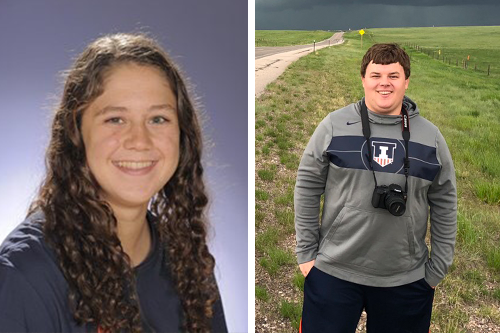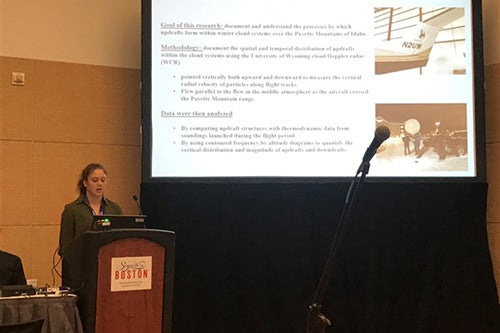As students in atmospheric sciences, Troy Zaremba and Kaylee Heimes both refer to their time conducting undergraduate research at Illinois as the highlight of their time on campus. Under the guidance of atmospheric sciences professor Bob Rauber, Zaremba and Heimes are working to better understand the impact of cloud seeding, a practice that has significant ramifications for solving the west’s water shortage problem.
The College of LAS recently had a chance to sit down with Zaremba and Heimes to learn more about their undergraduate research experience. For information on the research project, read more here.
 Q: Tell me more about your involvement with the cloud seeding research. How did you initially get connected? Then, what was your role on the team?
Q: Tell me more about your involvement with the cloud seeding research. How did you initially get connected? Then, what was your role on the team?
Troy Zaremba: I started doing undergraduate research with professor Rauber during my junior year on campus. It was as simple as responding to an email he sent out asking for help on this cloud seeding project taking place in the mountains of Idaho. It sounded interesting, so I said yes! Since then, I’ve now worked with Bob for four years – two as an undergrad and two more as a graduate student. I got to travel out west to be part of the field study my junior year and am now analyzing the data I helped collect.
Kaylee Heimes: I’ve known I wanted to study weather since middle school. So, when I met with professor Rauber during my freshman year and he suggested I get involved in his research project, I signed up right away. Like Troy, I help analyze and present the data that was collected out in Idaho. I’m now a sophomore and have been working with Bob and Troy for just over a year.
Q: For some, undergraduate research is just about adding another line to a resume. For you two, it’s obviously gone beyond that. What skills or relationships have you gained through this experience that will help you down the road?
Zaremba: I can’t say enough about what Bob’s research group has done for me academically and professionally. I learned to code and analyze data, I’ve seen what a field study looks like, and I’m now pursuing my PhD in atmospheric sciences because of my experience doing undergrad research at Illinois. It’s been incredible.

Heimes: Where do I start? I’ve learned about the entire research process. I’ve learned what goes into collecting and analyzing data. But the most impactful thing I’ve gained so far is learning how to present research. Earlier this year, I was able to present at the American Meteorological Society's Conference on Planned and Inadvertent Weather Modification in Boston. Being one of the few undergraduates at the conference, it felt like the scariest thing I’ve ever done. But I received runner-up, and it ended up being one of my favorite experiences at Illinois so far.
Q: A lot of students are reluctant to dive in on this type of undergraduate research. What advice would you give your peers about getting started?
Zaremba: Don’t be intimidated by your professors. I waited until my junior year to do research because it always seemed so daunting to initiate that type of relationship with these brilliant faculty members. But, in my experience, we have some of the most down-to-earth and approachable faculty of any university. Bob has been so helpful and supportive at every step of the research process.
Heimes: Do what you’re scared to do! That may sound like strange advice, but I think it’s so important just to put yourself out there, even when it makes you feel uncomfortable.
Q: What has been your favorite moment from your time working for professor Rauber?
Zaremba: Getting to go out to Idaho with professor Rauber to see the field study portion of the research first hand was incredible. Those few weeks have transformed the whole trajectory of my career.
Heimes: Besides presenting at the conference earlier this year, I’d say seeing professor Rauber’s reaction when I present data to him. After working really hard at working with a certain set of data, I presented it to him and I think his exact quote was: “Wow, this is like Christmas morning!” Definitely one of the highlights of my academic career!
What advice would you give to those considering attending the U of I?
Zaremba: Follow your passion. I have loved every second I’ve spent here at the University of Illinois. Even though the Department of Atmospheric Sciences is a smaller department on campus, big things are happening. There are abundant opportunities for research ranging from climate change to severe storms available to undergraduates. It’s been thrilling to have the opportunity to work with Bob and take part in undergraduate research.
Heimes: I would say that you’re not going to find the amount of support from the faculty or other students anywhere else. Everyone is willing to help you with whatever you’re struggling with and cares about you as a person above all else.